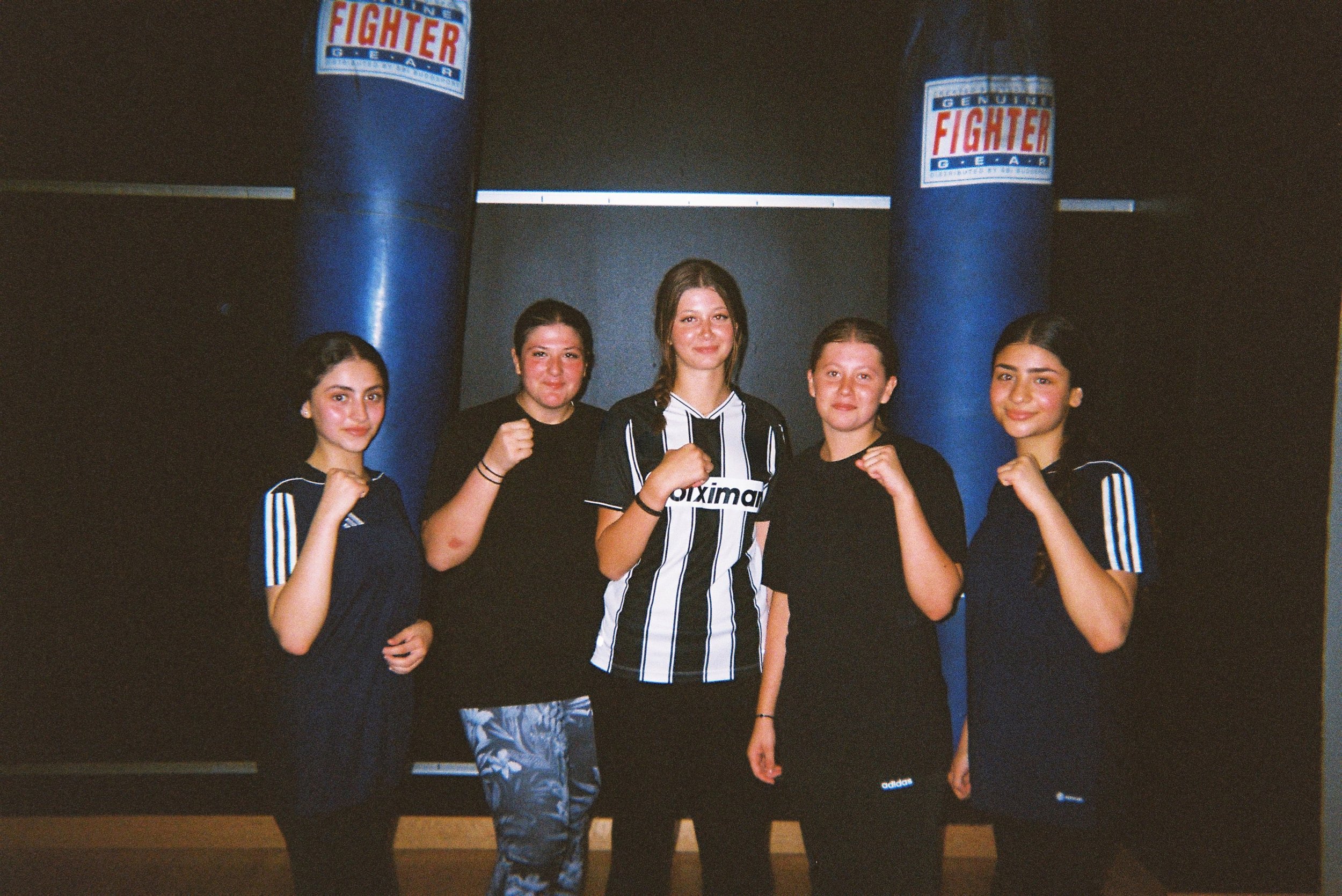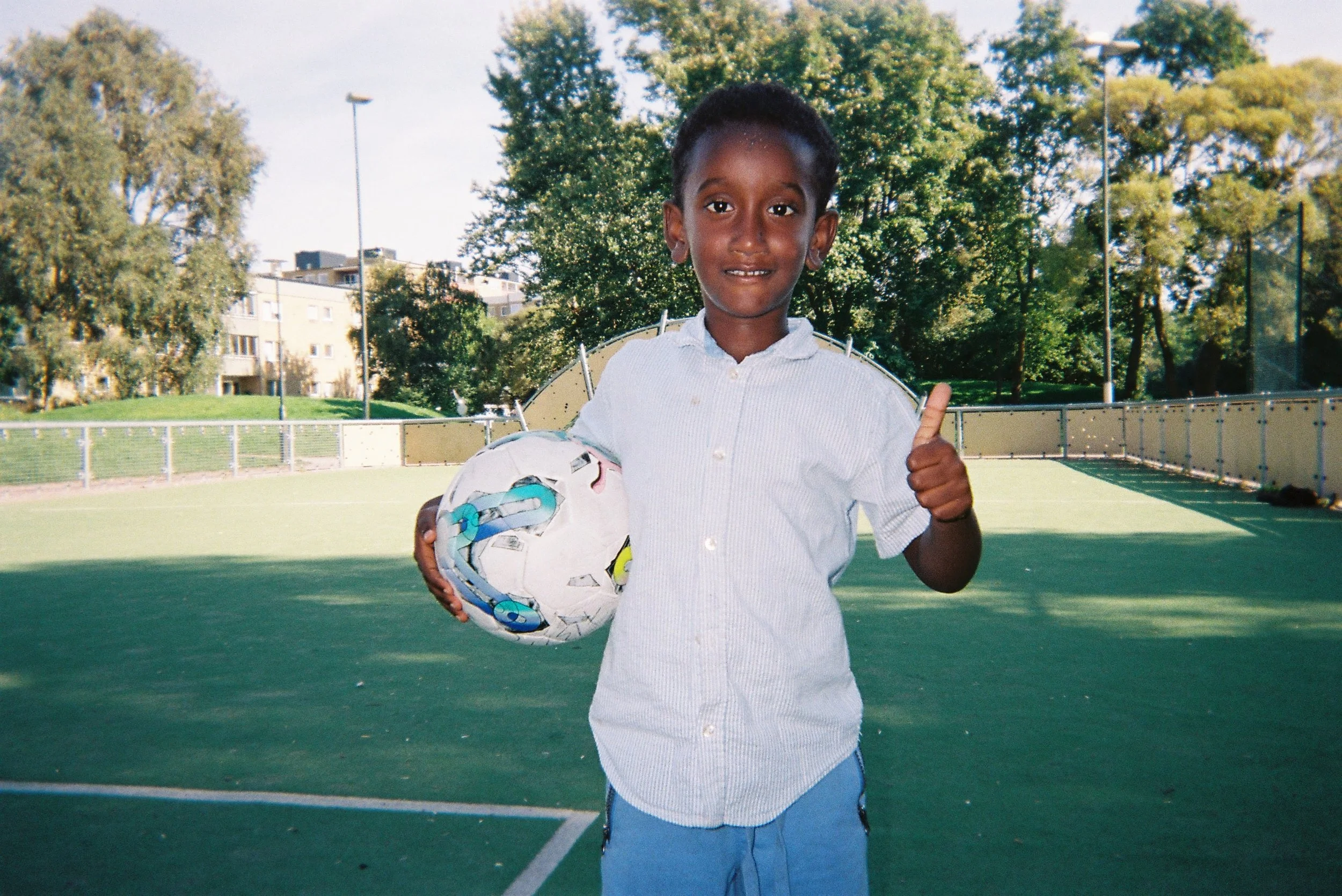Discipline, Adrenaline, Sweat
Dhilal Bahman Abdullah, Sweden
We have teamed up with the adidas Breaking Barriers Project to share the inspiring stories of 14 Champions across Europe as they advocate for women and girls in sport within their local communities. The second instalment of this series showcases eight Champions from Germany, Greece, the Netherlands, Sweden, and the UK who are advocating for the next generation of women in sport. Dhilal Abdullah is an adidas Breaking Barriers Champion and an activity leader with En Frisk Generation in Malmö, Sweden.
Want to join us in breaking barriers for women and girls in Europe? Join the adidas Breaking Barriers Academy.
Can you introduce yourself and tell us about how you got involved in sport?
My name is Dhilal. I am from Rosengård in Malmö, Sweden, but my family originally comes from Suleymani in Kurdistan. Since March 2022 I have been working as an activity leader at En Frisk Generation, as well as an adidas Breaking Barriers Champion. En Frisk Generation is an organisation that enables a healthier lifestyle and life paths for children who lack adequate life opportunities. En Frisk Generation does this by organising outdoor activities that promote exercise, rhythm, and fitness through play and movement. The main focus of my activities are games rather than sports, as the majority of the group are children between the ages of five and twelve years old. Sometimes, though, we do play football!
I work with En Frisk Generation to lead weekly activities at nearby parks. I bring various types of sports equipment, from footballs to cones and jumping ropes to frisbees. These items have value when they impact even just one child that participates in an activity.
Most of my work with En Frisk Generation takes place in the underserved socio-economic areas of Malmö, like Rosengård and Lindängen. Children in these areas have less opportunity to participate in various sports activities.
One thing we do at En Frisk Generation to promote healthier lifestyles is finishing off a sports day with a quiz. I ask the children questions related to healthy lifestyles and habits, as a means to intellectually stimulate and challenge them. The objective of the quiz is to enhance critical thinking regarding things like diet, exercise, and sleep. The activities are mainly aimed at children between the ages of five and twelve, as well as their parents or carers. If there is interest from others, such as teenagers, they are more than welcome to join.
As an adidas Breaking Barriers Champion, I and four other Champions created the ‘Tjejer in Medvind’ camp for girls. We have been working on the project since 2022 and launched in August 2023. We aim to give the girls the opportunity to develop their self-esteem, build strong networks, and find new paths for personal growth in sports.
What has your sports journey been like up until now?
I have been physically active ever since elementary school. I did not focus on one sport more than any other. However, I remember always staying active and fit by keeping up physically with my three sisters, who are all close in age to me.
Sometimes, we ran, other times, we played in the yard or wrestled. I had yet to have a burning passion for a specific sport that I could specialise in. Various martial arts were always a topic of interest for me, though unfortunately, I found it difficult to feel comfortable training with boys.
In April 2018, I heard about girls training in boxing for the first time in a basement a few blocks down the street. Ever since that day, I have boxed. At my boxing club, there are four different groups:
1) the children’s group is for those between the ages of 10 and 12;
2) the mixed group is for beginners;
3) the girls’ group is where I currently coach; and
4) the competition group, which is the advanced match group that requires more sparring and partner exercises.
However, the girls’ group was not prioritised, and would often go for periods of time without a coach. During the worst periods, the girls' training ceased altogether due to limited resources. This was when I jumped into the mixed group, and then progressed into the competition group, where I remain active to this day.
I was elected to the governing board of my boxing club and then decided to rejoin the girls’ group, in the aftermath of its previous discontinuation. Thankfully, it has been running since 2021, and is now led by a woman coach, unlike in previous years. With the club’s support, we have managed to cover the windows with curtains so that no one can see them during the girls’ practice. We created a place where the veiled girls can train with or without their veils as they see fit, without worrying about unappreciated and unwanted gazes.
I have, of course, encountered some obstacles during my journey through my sport, both as a boxer and also as a coach. Early on, I was often faced with statements like "You are a girl", as a response to the question of why my coaching was not taken seriously. This was in direct contrast to how I treated my own coaches.
I have encountered inappropriate comments during training. However, my club has adopted a zero-tolerance policy regarding inappropriate and disrespectful sexist comments. Fortunately, I had support from my coaches to stop the issues.
I have great passion and love for my training. I love the discipline required, the sweat produced, and the adrenaline rush. I love the dopamine produced after the workouts, the atmosphere during the sessions, and the people I train with. Training is a great source of energy for me, which is why I want to help provide more opportunities to train so that other girls have the chance to experience this side of the sport. I have developed a strong bond with the girls I train alongside. There is a lot of laughter and joy when we get together, and I feel like a big sister in my relationship with several of them.
Why did you start working in your community? Why are you motivated to do the work that you do? Why do you think your work with girls is important?
I started working with En Frisk Generation, as well as volunteering as a coach at the girls’ training because I wanted to make a healthy change in the lives of others. Some of the girls that I coach are vulnerable children and teenage girls, whom I can reach out to and connect with through our activities.
Despite the difficulties, my efforts have yielded results. The continuation of the teenage girl-focused workouts is important, even if there are sometimes just a few in attendance, because, often, it is these girls who are at risk of dropping out and not starting again.
What did you try to capture with your photos? Was there a deeper meaning to the photos?
The photos were taken during activities in Rosengård, Nydala, Lindängen, and Folketspark. There are also photos taken during the girls' boxing training at Malmö Boxningsklubb and the adidas Breaking Barriers Project camp En Frisk hosted in Bosön.
My favourite photograph is the one showing families in Folkets Park that were previously strangers coming together through their children participating in the activity. This image conveys the community that the activity helps facilitate.
The photographs remind me of the impact that I have within my community by bringing people together through various activities. This makes me feel proud because I know that I am contributing to the community.
Why is sport important for your community?
Sport is important for maintaining a healthy lifestyle, both on an individual level and also on a societal level. It is important for local sports activities to take the initiative to strengthen relationships in my community.
When I have activities with En Frisk Generation coming up, I go on a recruitment round where I tell everyone in the area about the activity that will be held. During the activity itself, the parents start talking to each other because of a common interest in their children, while the children get to know each other and create new friendships. Sometimes, even after we have finished the activity, the children continue to play together.
Sport is also important for engaging those at risk to ensure they do not spend their afternoons in destructive settings that would lead them down a negative path. Instead, the children in these at-risk areas are now able to spend time outdoors, putting their energy into physical activities. By supervising these activities, I am able to be a role model for many young children to help them make the right choices as they get older.
What are some of the prevailing challenges for women and girls in your communities? What impact has the adidas Breaking Barriers Project had on your journey as a leader and change-maker in women’s sport?
For women and young girls in my community and worldwide, there are various prevailing challenges to participating in sport. These include lack of time, lack of money, and gender inequality. For some, one instance of gender-based discrimination can be the reason they stop training altogether.
The adidas Breaking Barriers Project is a commitment that strives to enable young girls in to play and stay sports, while fostering an environment where they can develop as athletes and individuals. Our project has been a game changer for girls as we organise inspirational speeches and hold team activities. Through various team-based challenges and activities, girls had the chance to learn the importance of teamwork, cooperation, and support in sports. We have had an equality focus through interactive discussions and training to promote inclusion and equal opportunities for girls in sports.
What do you think the future looks like for sport in your community and Sweden? What do you want to change? How would you improve gender equality?
I have come across many other organisations that work and fight for the same goals. I believe that for both my community, as well for Sweden, we are moving towards better equality within sport. I want to change unhealthy lifestyle habits and spread knowledge. By continuing to engage in the activities and projects that I am currently doing, I hope to improve gender equality.
















